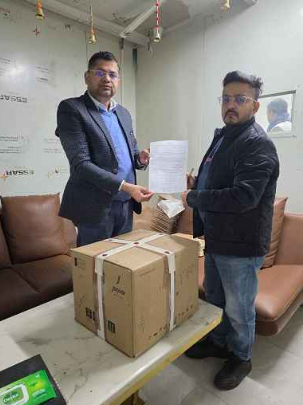
New Delhi/Bangalore: It poured for domestic medical device industry while it was waiting for rain for long. The joys of its captains are knowing no bounds. From lip service to making it a flagship ‘Make in India’ project, the industry has taken a giant leap, if announcements made by Union minsters in Bangalore last week are any indication. Medical device may get independent central ministry too. The proposal to this effect has been recently sent to PMO for urgent consideration.
Its upshot would be: Our over dependence on imports of medical devices at astronomical cost would come to an end. As a logical corollary to this, the cost of treatment in India would come down substantially. As of now, India imports over 70 percent of medical devices. Dispovan syringe like domestic success stories are few and far between.
Central Ministers in the inauguration of National Conference on the theme ‘Indian Pharma and India Medical Devices-2017’ on February unleashed unprecedented hope by their categorical announcements. Rajiv Nath, coordinator, Association of Indian Medical Device Industry ( AiMeD), who often complained about half measures and lack of policy back up to this industry from the government seemed quite upbeat. Rajiv Nath said, if today’s announcements are coupled with 6 point road map (enumerated in the last of the report) presented by AiMeD, domestic medical device industry would witness a sea change in one year time.
Minsters informed that in order to boost ‘Make in India’ program and reduce import dependency, the central government has decided to include back medical device sector as one of the 25 flagship industry to steer the program.
Union Minister of state for Commerce, Ms Nirmala Sitharaman, said in no uncertain terms, ‘Medical devices are now being made a part of 25 ‘Make in India’ focus sectors. I hope like Pharma has earned respect worldwide, medical devices similarly may earn respect globally and achieve global manufacturing competitiveness.’ The conference was attended by senior representatives from Central and State governments as well as top representatives from pharma and medical device sector.
Delinking of medical device from pharma sector was also announced so that it can chart a distinct and definitive course along with distinct and facilitating regulatory framework. The same was announced by Shri Ananth Kumar, the Union Minister for Chemicals and Fertilizer.
‘It is time for this sector to fly like butterfly and the pharmaceutical and medical devices to be spun off as a separate ministry of pharmaceutical and medical devices. I have recommended this to the Prime Minister and this request is under active consideration by the PM and PMO,’ said Mr Kumar.
It is to be noted that till now, the medical device sector has been governed by the “Drugs & Cosmetics Act, 1940” which was primarily meant for regulating the pharmaceutical industry and for pharma manufacturing purpose. Globally, the medical device industry is completely separate from pharma sector and governed by separate set of legislations and regulatory framework. The Indian medical device industry has for a very long time been saying that this inconsistency has been one of the chief bottlenecks for the growth of the industry and hampered its development as globally competitive on the lines of Indian pharma sector. Currently India imports over 70% of its medical device requirements and the total annual market size is estimated at over USD 10 billion.
The government has also decided to bear the cost of effluent treatment plant and provide some basic facilities free of cost at the upcoming medical device parks in states such as Andhra Pradesh, Haryana, Gujarat and Maharashtra, to make it globally competitive. This move has the potential to bring down the cost of medical device manufacturing in India by as much as 30%.
Industry has wholeheartedly lauded the latest developments and the Government’s decision to boost domestic medical device.
Ministers also spoke about the need of affordability, availability, acceptability and also the need for viability
Mr Nath of AiMeD was part of the special invitees to the Conference. AiMeD has been striving and advocating for years for medical device to be accorded distinct identity, saying given separate regulatory framework domestic medical device industry could realize its potential while India’s humungous import dependency comes down.
AiMeD has also recommended and submitted 6-point roadmap to the government for making India a true global powerhouse for medical devices. These include:
1: Tariff Rationalisation: Basic Import Tariff to be 10% for Medical Devices (whose Export is over 5 Crores) and Duty on Components to be 5% Next Year and 7.5% thereafter as a Make in India Enabler. Concessional Duty on Raw Material may be retained at 2.5% for now, for Next 3 Years.
2: Regulations for Patient Safety: Draft Proposed Regulatory Rules to be amended for :
i) Voluntary Compliance backed by 3rd Party ICMED Certification to be considered as a Compliance option.
ii) Cover High Risk Devices also in 3rd Party Certification as being done for Low Risk.
3: Buy Indian Policy of Preferential Market Access and Preferential Pricing (as per World Bank Terms) for Indian Medical Device for Indian Public Healthcare Tenders
4: Consumer Protection: MRP labelling to be enforced on Unit of Sale of Medical Devices. No NPPA for Medical Devices other than case of Stents (Combination Device, having Drug). Introduce Price Cap Mechanism of 4-5 times Ex-Factory / Import Landed Price in a Phased Manner or bring in a 1% Cess on Excise / GST on MRP to act as Disincentive for putting Exorbitant MRP and to incentivise ethically correct Low MRP.
5: Ban on Refurbished Medical Equipment, for Next 5 Years till such time we have a strong Regulatory Regime to ensure validated and calibrated Equipments limited access, for enabling Patient Safety.
6: Medical Device Export Promotion & Import Substitution Council – It can be called by any Name, but to focus on these aspects, to address India’s 70% Import Dependency, 90% on Medical Electronics.








